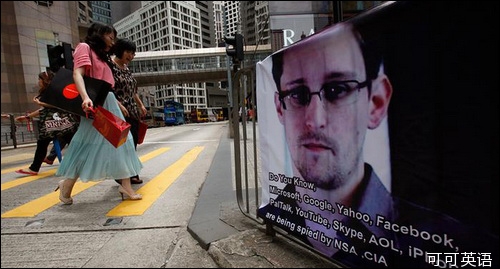(单词翻译:单击)

Europe's politicians are outraged about alleged US monitoring of EU telephone and computer communications. But when it comes to building and exporting spy equipment, few are as capable as Europe.
对于美国涉嫌监控欧盟(EU)电话和电脑通信,欧洲政界感到非常恼火。但要说制造和出口间谍设备的能力,没有多少地方能赶得上欧洲。
That much was evident last month when the world's leading sellers of electronic surveillance technology gathered in Prague at the ISS World trade show. Police and spy agency officials listened to closed-door presentations by a succession of European companies about their sophisticated internet and telephone interception wares.
这一点在上个月表现得非常明显。其时,世界顶尖的电子监控技术销售商云集布拉格,参加情报支持系统世界(ISS World)贸易展。展会上,来自警界和间谍机构的官员听取了由一系列欧洲企业所作的不公开报告,介绍它们生产的各种复杂的互联网和电话窃听产品。
Hacking Team, a Milan-based maker of eavesdropping software, demonstrated its remotely controlled spyware that can tap encrypted communications, Skype calls and instant messenger chats.
总部位于米兰的窃听软件开发商Hacking Team展示了自己的远程控制间谍软件,该软件可以窃听加密通讯、Skype通话及即时通信工具上的聊天。
Munich-based Trovicor schooled agents on its “cell-based monitoring solution” to handle mass recordings, while Gamma International, an Anglo-German company, demonstrated its “FinFisher” spyware tool for remotely monitoring mobile phone communications.
总部位于慕尼黑的Trovicor向特工们展示了如何使用其“基于蜂窝系统的监控解决方案”来处理海量记录。而英德合资公司Gamma International则展示了一款可用于远程监听手机通信的间谍工具“FinFisher”。
At a time when European countries are loudly condemning the US and UK's spying activities, Europe's spy technology expertise is a potential source of embarrassment.
在欧洲国家高声谴责美英的间谍活动之际,欧洲在间谍技术方面掌握的专业知识可能会令其陷入尴尬。
Privacy activists and politicians fear that, if left unregulated, sales of European surveillance technology could infringe human rights overseas, as well as damaging the cyber security of Europeans.
主张保护隐私的活动人士及政界人士担心,如果不加监管,欧洲监控技术的销售可能不仅会侵犯其他地区的人权,还会破坏欧洲的网络安全。
Marietje Schaake, a Dutch MEP who has campaigned for better export controls on surveillance technology, says: “We in the EU must ensure we practise what we preach.”
来自荷兰的欧洲议会议员(MEP)马利耶特捷•沙克(Marietje Schaake)一直为加强对监控技术出口的控制展开活动。他表示:“欧盟必须确保言行一致。”
Almost all countries have rules requiring telecommunications companies to build in functionality that enables law enforcement to monitor electronic communications, subject to a warrant. This statutory right is known in the business as “lawful interception”.
几乎所有国家都设有法规,要求无线通信企业内置功能模块,令执法部门能依照许可监视电子通信。这种法定权利在商业上被称为“合法监听”。
The US has by far the biggest national budget for surveillance technology but tends to buy large bespoke surveillance systems from US contractors. US tech start-ups often receive NSA/CIA funding and are discouraged from selling overseas, says Jerry Lucas, organiser of the Prague event. This means more than 50 per cent of the almost $6bn a year market for off-the-shelf surveillance equipment is controlled by western European companies, according to Mr Lucas.
美国在监控技术方面投入的国民预算迄今远远超过其他国家,但美国通常从本国的合同商那里采购大型定制监控系统。在布拉格举行的贸易展组织者杰瑞•卢卡斯(Jerry Lucas)表示,美国的初创技术公司经常从美国国家安全局(NSA)或中央情报局(CIA)那里得到资助,而且美国不鼓励这些公司向海外出售产品。根据卢卡斯的说法,这意味着每年近60亿美元的非定制监控设备市场超过一半的份额被西欧企业控制。
“It's not helpful to say that all surveillance is bad – think about how it can be used to deal with child porn, organised crime or terrorism,” said a European vendor who declined to be identified.
一名拒绝透露身份的欧洲生产商表示:“说监控一无是处是没什么用的——我们应该考虑如何让这种技术在打击涉及儿童的色情作品、有组织犯罪或恐怖主义方面发挥作用。”
Lawful interception becomes controversial when governments use it to commit crime rather than fight it. “In countries with no regulation, interception can be used by governments to secure power by spying on its citizens,” Frost & Sullivan, the consultancy, noted in a 2011 study.
当政府用合法监听来犯罪(而不是打击犯罪)时,合法监听就会引发争议。咨询公司Frost & Sullivan在2011年发布的一份研究报告中指出:“在没有监管的国家,政府可能会利用监听技术来监视本国公民,以维护自己的权力。”
When protesters stormed security service headquarters during the Arab Spring uprisings, they often found secret police had purchased European surveillance technology to monitor protesters.
在阿拉伯之春(Arab Spring)反政府暴动期间,当抗议者猛攻安全部门总部时,他们经常发现,那些秘密警察购买了欧洲的监控技术来监视抗议者。
Amesys, a French company formerly owned by Bull Group, sold its Eagle internet analysis software to Colonel Muammer Gaddafi's Libya in 2007 and was sued by the International Federation for Human Rights (FIDH) for alleged complicity in torture. The claim is being contested.
曾属于布尔集团(Bull Group)的法国公司阿梅希思(Amesys),在2007年曾将自己的一款名为Eagle的互联网分析软件卖给穆阿迈尔•卡扎菲(Muammer Gaddafi)统治下的利比亚。该公司后因涉嫌“共犯酷刑”(complicity in torture)被国际人权联盟(FIDH)起诉。诉讼目前正在进行中。
Bull last year divested the unit and explained it signed the Libya contract during a period of Libyan rapprochement with the west. Bull says its business dealings complied with international requirements and firmly denies complicity in torture.
去年布尔集团出售了阿梅希思,并解释说,该公司是在利比亚与西方恢复友好关系期间与该国签订的合同。布尔表示其商业运作符合国际法规定,并坚决否认曾“助纣为虐”。

In spite of these problems Mr Lucas says business is booming: “The public relations issues have not hurt the industry. It has created more demand.”
尽管出现了上述问题,卢卡斯表示,公司的业务仍在增长:“公关问题并未损害这一行业。需求增加了。”
Mr Lucas does not allow attendees from Iran, North Korea or Syria at his trade shows but otherwise he claims ethical concerns are “not our responsibility”.
卢卡斯不允许来自伊朗、朝鲜或叙利亚的人参加他的贸易展,不过除此之外,他声称,道德问题“不是我们的责任”。
“We say: here are the tech products. What countries do with the technology they buy, that's up to them to decide.”
“我们不过是说:这里有技术产品出售。至于各国要用买到的技术干什么,那是他们自己说了算的。”
Hacking Team does not sell to countries blacklisted by international organisations such as the EU, Nato and the US. In addition, an independent external board takes potential human rights issues into account before approving a sale.
Hacking Team不会将产品卖给被欧盟(EU)和北约(NATO)等国际组织、以及美国列入黑名单的国家。此外,在批准一笔销售之前,会有一个独立的外部委员会负责权衡潜在的人权问题。
Europe and the US block the sale of surveillance technology to Syria and Iran, but activists say export restrictions do not go nearly far enough.
欧美禁止将监控技术出售给叙利亚和伊朗,不过活动人士表示,目前对监控技术出口的限制还远远不够。
Eric King, head of research at Privacy International, says: “Lawful interception can only happen when there is the rule of law. [The export of] arms, weapons, bulletproof vests – even flares – are controlled. But surveillance equipment is not. And in the wrong hands this technology is just as dangerous.”
隐私国际(Privacy International)研究部门主管埃里克•金(Eric King)表示:“只有在法律法规存在的情况下才会存在合法监听。军火、武器、防弹衣甚至信号弹(的出口)都是受控的。但监控设备却不受控。而这种技术如果被邪恶势力掌握会造成同样大的危害。”
The European parliament in October endorsed a proposal by Ms Schaake that would oblige EU companies to ask for export authorisation if they had reason to believe the export might infringe human rights or EU strategic interests. However, it has not yet become law.
欧洲议会(European Parliament)十月批准了沙克提出的一项议案,该议案将强制性要求欧盟企业在有理由相信某项出口可能侵犯人权或欧盟战略利益的情况下,必须申请该项出口的授权。不过,这一提案还未成为法律。
But apart from Ms Schaake, few European politicians appear to have recognised that the prolific export of surveillance technology also poses a direct threat to the continent's security. It was James Clapper, US director of national intelligence, who told the US Senate in March foreign governments were using surveillance technologies marketed for “lawful interception” to target US systems.
但除沙克以外,欧洲政界似乎已经意识到监控技术的大量出口会直接欧洲大陆自身安全的人寥寥无几。提出这个问题的人是美国国家情报总监詹姆斯•克拉珀(James Clapper):他在3月份向美国参议院(Senate)表示,外国政府正将矛头对准美国的系统,使用就是那些以“合法监听”名义销售的监控技术。
“It seems strange to turn a blind eye to selling hacking technology when European governments are at the same time investing in cyber security defence,” says Christopher Soghoian, a security and privacy researcher at the American Civil Liberties Union.
美国公民自由联盟(American Civil Liberties Union)研究安全与隐私问题的研究员克里斯托弗•索戈扬(Christopher Soghoian)表示:“奇怪的是,欧洲政府一方面对出售黑客技术睁一只眼闭一只眼,另一方面又大力投资于网络安全防护。
“The government claims to be protecting civilians' data and domestic businesses from foreign attack. But . . . this industry is in direct conflict with that goal.”
“政府声称它在保护公民的数据以及本国企业不受外国攻击。然而……这一行业与该目标直接冲突。”


